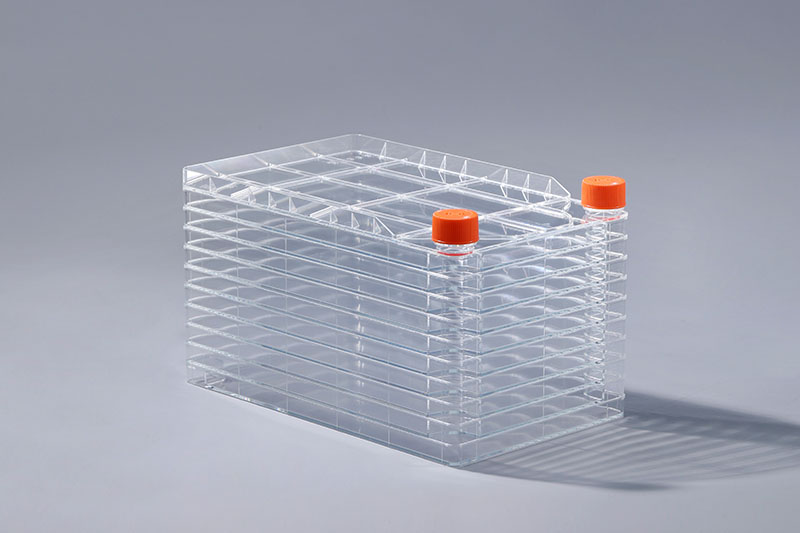The cell factory is a consumable that is often used for adherent cell culture. During the experiment, we need to grasp the growth state of the cells in real time and make relevant adjustments according to the specific situation. Cell viability can be detected by MTT method to determine cell growth.
MTT method, also known as MTT colorimetric method, is a method for detecting cell survival and growth. The detection principle is that succinate dehydrogenase in the mitochondria of living cells can reduce exogenous MTT to water-insoluble blue-purple crystalline formazan and deposit in cells, while dead cells have no such function. Dimethyl sulfoxide (DMSO) can dissolve formazan in cells, and its light absorption value can be measured by enzyme-linked immunosorbent assay at 570nm wavelength, which can indirectly reflect the number of living cells. Within a certain cell number range, the amount of MTT crystal formation is proportional to the cell number. This method has been widely used in the activity detection of some biologically active factors, large-scale anti-tumor drug screening, cytotoxicity test and tumor radiosensitivity assay. It is characterized by high sensitivity and economy.
Before testing the viability of cells in the cell factory, a very important step is the formulation of MTT. Typically, the MTT concentration in this method is 5 mg/ml. Therefore, 0.5 g of MTT can be weighed, dissolved in 100 ml of phosphate buffered saline (PBS) or phenol red-free medium, filtered with a 0.22 μm filter to remove bacteria in the solution, and stored at 4°C in the dark. . During preparation and storage, try to wrap the container with aluminum foil.
When using the MTT method to measure the cell activity in the cell factory, it should be noted that MTT is carcinogenic, so be careful when using it. This method can only be used to detect relative cell number and relative viability, but not absolute cell number. When testing the results with a microplate reader, in order to ensure the linearity of the experimental results, the MTT absorbance should be in the range of 0-0.7 as much as possible.
The FAI climbed 5.9 percent year-on-year in the first 11 months of 2018, quickening from the 5.7-percent growth in Jan-Oct, the National Bureau of Statistics (NBS) said Friday in an online statement.
The key indicator of investment, dubbed a major growth driver, hit the bottom in August and has since started to rebound steadily.
In the face of emerging economic challenges home and abroad, China has stepped up efforts to stabilize investment, in particular rolling out measures to motivate private investors and channel funds into infrastructure.
Friday's data showed private investment, accounting for more than 60 percent of the total FAI, expanded by a brisk 8.7 percent.
NBS spokesperson Mao Shengyong said funds into weak economic links registered rapid increases as investment in environmental protection and agriculture jumped 42 percent and 12.5 percent respectively, much faster than the average.
In breakdown, investment in high-tech and equipment manufacturing remained vigorous with 16.1-percent and 11.6-percent increases respectively in the first 11 months. Infrastructure investment gained 3.7 percent, staying flat. Investment in property development rose 9.7 percent, also unchanged.
 English
English



















































